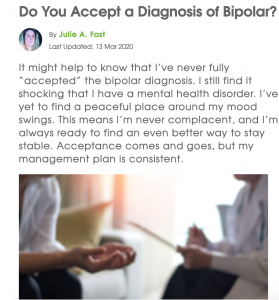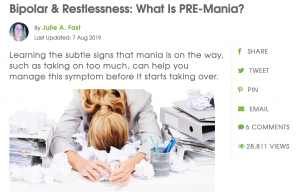Julie A. Fast's Blog, page 8
April 12, 2020
What is Dysphoric Mania in Bipolar Disorder?
Related posts:
BIPOLAR DISORDER MANIA 101: Do you know the difference between dysphoric and euphoric mania?
Newsletter: Mania, hypomania, euphoric mania, dysphoric mania- my plea to you!
What is Dysphoric Mania in Bipolar Disorder?
Help for Bipolar Depression and Anxiety Symptoms during Coronavirus Quarantine with Julie A. Fast
Related posts:
How to Help Bipolar Symptoms During Coronavirus Quarantine
Help for Depression During Coronavirus Quarantine
How are Your Bipolar Disorder Symptoms During the Coronavirus?
April 11, 2020
My Thoughts on Acceptance of the Bipolar Disorder Diagnosis
This article was originally published on the Bp Magazine webpage.
Acceptance comes and goes. I roll with it….
Degrees of Doubt
Never completely accepting that I have bipolar doesn’t mean that I don’t work hard to manage the illness daily. I work on this management despite my inability to calmly accept that this bipolar is in my brain for life.
There is no magic date that I can look to where I changed so profoundly that having bipolar became easier. I don’t have a specific number of days—or even years—I can use to measure success. Bipolar management is usually three steps forward and two steps back. I then have to count the one step I did manage to stick to.
It’s okay if your acceptance comes and goes. One day, you’re open to having bipolar; the next, you feel that it’s impossible your diagnosis is true. This is the struggle. We can’t see this illness. There is no genetic test. There is no blood test. It doesn’t show up on a brain scan. It’s diagnosed by examining behaviors and thinking.
It makes total sense we would doubt what is going on even when we’re the ones with the symptoms!
– Embrace the doubt.
– Embrace the up-and-down nature of believing and then not believing.
– Embrace not fully accepting that this illness is real.
Just say yes to getting help with your moods and behaviors. That is all that matters.
What’s the Point of “Accepting” a Diagnosis?
If you have mania and depression that you can chart, you have bipolar.
Acceptance doesn’t affect whether or not you have the illness. You either have bipolar or you don’t. It’s like diabetes. Acceptance just makes life easier. It’s a calmer life when we say, “I’m not happy about this, but I know that I have bipolar and have to do something about it.”
If you’re here because you don’t think you have bipolar, and you’re upset that others say you do: First, I commend you for reading this. Second, why not figure this out and then do something to find peace?
Start with this question: What do the people around you think about your behavior?
Are your loved ones in pain because of your moods?
Has someone asked you to go to the doctor, but you’ re scared to face the reality of having bipolar?
Do people ask you to chill out, to stop being so paranoid, to be nicer, or to curb your sexual behavior?
Do you have a relative with bipolar, but you can tell you’re not “crazy” like them?
Do people say, “GO GET SOME HELP!”?
If you’re on the fence about getting help and are reading this privately, it means you KNOW you need to make changes in order to feel better. If you do have bipolar, you will find articles and blogs here that match what you experience.
Why I Continue to Accept That I Have Bipolar
I feel better knowing why I get so sick. Calling it bipolar helps me. The diagnosis changed my chaotic life for the better. I want us to face reality.
If you’re on a page that is 100% devoted to bipolar, you’re not in denial. Maybe you’re scared. Maybe you’re confused. Maybe you’re hoping you don’t have the illness. But you’re not in denial. Whew!
I encourage you to do what works for you to get help.
There are many resources available to you. In my book Take Charge of Bipolar, I outline what to do if you are diagnosed. The print and digital issues of bp Magazine are filled with helpful ideas. And this website, bphope, is a gold mine of stories and strategies to help you find stability, if that is what you seek.
You don’t have to live a life of full acceptance. Just a little acceptance is enough. Keep going.
Saying yes to the diagnosis changes life for the better.
Acceptance comes and goes. Roll with it.
Julie
Related posts:
BP Magazine. How Do You Define Acceptance?
April 8, 2020
How to Manage Mania by Knowing the Very Beginning Signs of a Manic Episode
Originally published on the Bp Magazine Website as Bipolar and Restlessness: What is Pre-Mania?
Learning the very first signs of a bipolar mania mood swing is the only way I have found to stop big manic episodes. If I don’t catch my mania early, I will let it flourish as I want to get things done. Mania almost always gives us little signs that it is staring. I’m calling this “PRE-Mania.” It has the following symptoms:
We have trouble sleeping
Other people bother us. It’s as though they are talking too fast or want to pick a fight with us.
We know we need to slow down, but we can’t or we will get behind in work.
We take on too much work due to our extra energy but feel stressed when we try to get it done.
Our legs are restless and we often shake one leg up and down while sitting to deal with the excess energy.
We don’t feel good physically or mentally.
Our music choices are stimulating and slightly louder than normal.
Others tell us we are talking too loud or ask, “Are you getting manic?” which makes us angry as we are not fully manic, but we are on the edge, so we are prickly.
If you have any of these symptoms, now is a VERY good time to stop what you’re doing, take stock of your actual mood and make a decision to stop the “Pre-Mania” before it goes too far.
It is 5 PM on a Saturday night as I write this. My mind is buzzing and I have way too many to do lists next to me. All I want to do is work for hours and hours and get caught up on life.
The past week was a bit of a downer and work was very difficult. To compensate, I worked too much and I’m now overstimulated. It’s not euphoric hypomania and it’s not quite yet dysphoric hypomania, but it’s right on the edge. If I continued to work for a few hours or decided to go out with friends for something stimulating such as karaoke, there is a GOOD chance I would get hypomanic.
Here is how I take care of this “PRE-Mania” and prevent it from turning into actually mania.
I stop working. This means turning off the computer and reading a book, one I hold in my hands! Or I go to a dark movie theater and stay away from caffeine.
I take my meds. If I feel I can control this, I don’t have to take extra meds, but if I still have a terrible time sleeping tonight and am still wired tomorrow morning, I will have to take an extra dose. I HATE this. But I will do it.
I remind myself to calm down. I can make smart choices around my bipolar.
Mania is not inevitable. It’s not something I can give in to in order to get more done. I’m past that in my management life. I want to be stable. This means saying no to myself, saying no to being overstimulated, taking my meds and shutting off the computer until I have calmed down.
What do you need to do in life to prevent the PRE-Mania from turning into something that WILL disrupt your life?
Julie
Related posts:
Bipolar Mania: subtle signs!
Watch out for Summer Mania! Do you know the first signs of your manic episodes?
Newsletter: Mania, hypomania, euphoric mania, dysphoric mania- my plea to you!
April 7, 2020
Bipolar Disorder Help During the Coronavirus

This article was originally published in Bp Magazine under the title Stability, Bipolar & Coronavirus (COVID-19)
It was the first article I wrote when it became obvious that many of us would be staying at home.
**
This is the first time the world has watched a pandemic unfold in real time. For this reason, emotions are high, and uncertainty is raging. What can we do as people affected by bipolar disorder to make sure our BRAINS stay well while the world changes before our eyes?
Let’s Start with the Basics
Bipolar Medications.
Write your doctor today and calmly explain that your bipolar often comes with anxiety, and this virus experience is a trigger. For this reason, ask for your regular meds to be on a double script if possible. Ask for more automatic refills—at least six months out. Thank your doc for continuing to work during this outbreak. If you have to go into the office to get psych shots, take care of this now. If you need blood tests, get one now. Be proactive. Don’t cancel appointments. Simply have them by phone or video.
Irritation.
Getting pissed off is often a by-product of fear. If you’re stuck at home with roommates you rarely see or family members whom you need to avoid for your own stability, make a plan now. You determine your relationships. Make a pact with yourself now. You will not fight or get irritated with others.
Depression & Hopelessness.
A world crisis will naturally affect the depressed brain. If you’re already feeling hopeless and helpless in regular life, you will feel this even more today. Use this mantra: “It’s natural that I feel this sick. The world is off its axis, and I need to focus on my brain and my brain only. I have been through this before and will go through it again. A virus is not a reason to get more depressed. I am going to treat this depression right this minute and get help.”
Anxiety & Paranoia.
If you’re already on the anxious side—and especially if you’re prone to paranoid psychosis, as I am—now is the time to turn off the sources that feed this paranoia. This especially includes politically charged social media. Removing the inflammatory triggers of paranoia and anxiety can cut your symptoms in half. Ask yourself if being “informed” is worth the pain of anxiety and paranoia.
Hypomania & Mania.
This sneaky symptom may make you less worried about the virus, and, for that reason, you will take personal-contact and especially sexual-behavior-contact suggestions less seriously. If you’re starting to feel manic now, acknowledge it and use your plan to get stable. Now is not the time for wildness.
Pets.
For many, taking care of pets is like taking care of a child. How is the food situation as of now? Does your pet need a vet appointment? What about grooming? Make a list of your pet’s needs over the next three months, be the superhero you are, and go through the list one at a time.
Social Media.
Oh, my goodness. If we believe everything on social media, all of the toilet paper is gone and there is brawling in the aisles of grocery stores around the world!
While no one can deny that there has been some fighting over products, it’s important to know that there is always conflict in stores. It’s not new. We don’t have a “social media IV” attached to our brains. It is up to us, as people with bipolar, to TURN OFF what makes us sick.
Social media wants you to stay, so they will play on your worries. If you choose not to turn it off completely, at least be aware of what you are viewing. Look at the words and images they use to suck you in. Be thoughtful and intelligent and truly see the reality of what they are selling: FEAR.
If You Feel an Episode Brewing…
What if your symptoms are getting worse, and you can tell you’re heading for an episode? I have many articles on this topic, and you can use the ideas step by step to calm your brain and prevent a big episode. I also recommend the work of Melody Moezzi.
If you’re reading this and thinking, “Oh, it’s the stuff Julie always says! ‘Take care of yourself and be a detective and remove triggers!’” Yes. It is the same.
Like all illnesses, bipolar responds to a plan. It’s a triggered illness. You have so much more control than you think, if you’re not feeling well right now.
General Strategies to Stay Stable During the COVID-19 Outbreak
You can take charge of your brain. Bipolar disorder responds to management, and removing triggers is the best way to handle this crisis. If you have my book Take Charge of Bipolar Disorder, now is a good time to read the triggers chapter again!
Yes, I am a repeating robot, but this is what works:
If you are really getting sick, turn off social media and ask stable friends for updates.
If it’s moderate, turn off the social media that raises fear, anxiety, and anger, and focus on what creates positive feelings.
Call someone right now. Say hello with your voice. Leave voice messages.
Don’t cancel support groups. Set them up online or on the phone through services such as Free Conference Call. Make sure you have all of your bipolar appointments. Don’t cancel!
Write/contact every place where you have monthly fees and services and ask the business to waive fees for a month or more.
If you meet with a substance-abuse support group, move it all online or on the phone. Don’t cancel. Even if you do this with a few members, it’s worth it.
Remember…
What we are going through now is not permanent. Seasons change, and the world is up for the task. We are working together. Let’s find the not-so-awful part of this current situation:
Is this a time for a deep clean of your room or home?
Is it time to reconnect by phone with old friends?
What opportunities come up when the world slows down?
We are in control of ourselves. Let’s use this time to be smart about the rotten bipolar symptoms that probably will show up, get help, and then take the time to reflect on what we want in our lives. I am trying to use this system, and, so far, I am not overly panicked—even when facing my worries about money and health. That is pretty good, considering the brain I live with daily!
Julie
Related posts:
I’m not as disciplined as you might think………
How are Your Bipolar Disorder Symptoms During the Coronavirus?
Depressing media coverage of our ‘economic’ situation
Julie A. Fast's Blog
- Julie A. Fast's profile
- 67 followers






